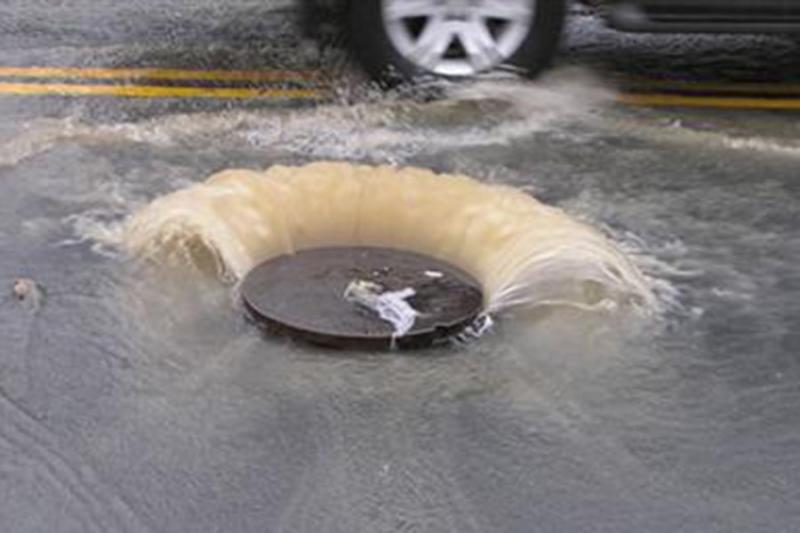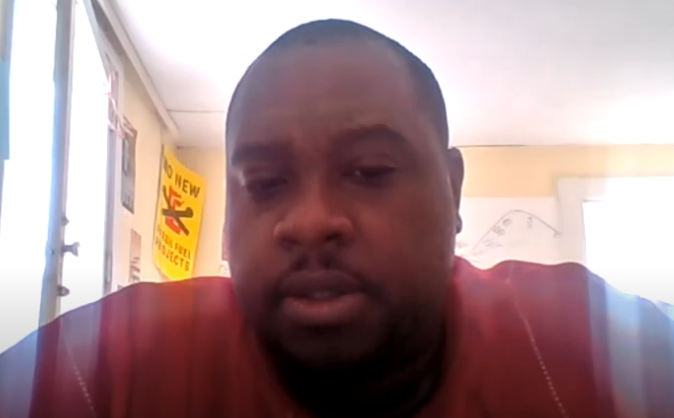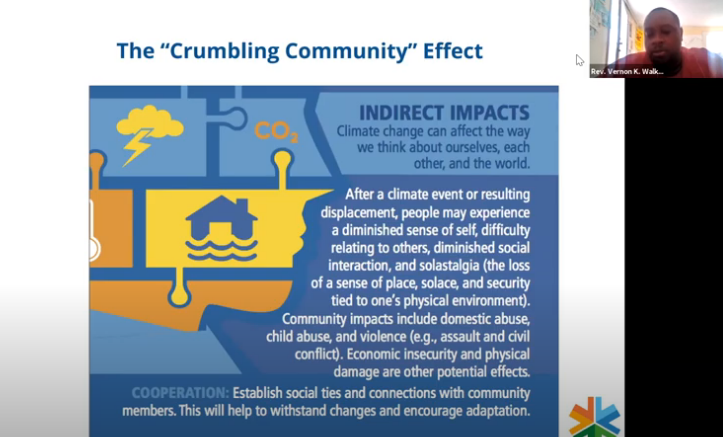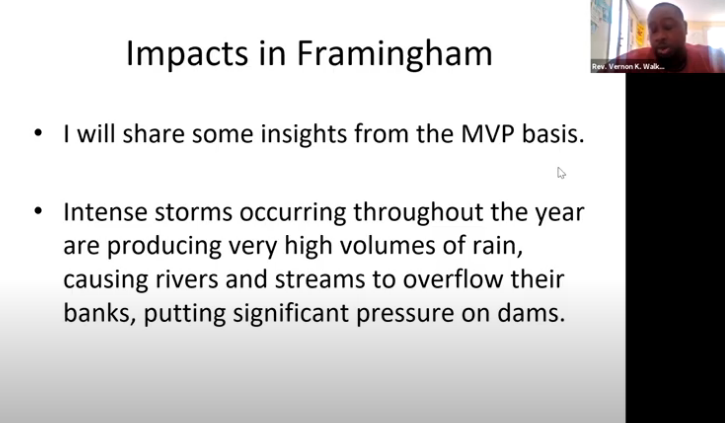By Talia Heisey
***

FRAMINGHAM – While COVID has laid bare the inequities at the heart of America’s system with its disproportional affects on black, Indigenous and people of color (BIPOC) communities, Rev. Vernon K. Walker believes “the preeminent social justice issue of our time is climate change.”
Rev. Walker, who is the program manager of Communities Respond to Extreme Weather (C.R.E.W.), discussed how to build community resilience to strengthen the capacity to respond to climate emergencies at a virtual lecture hosted by the Framingham Public Library on March 8.
Rev. Walker discussed the impacts of climate change on all and in particular, those who are disproportionately affected. He also shared ways to prepare for extreme weather as a community.
With very little being done about to prevent its cataclysmic impacts, climate change presents an unstable and ever changing future, making it necessary to adapt before it its too late, said Rev. Walker.
“From shifting weather patterns that threaten food production, to the rising sea level that increased the risk of catastrophic flood flooding, the impacts of climate change are global in scope and unprecedented in scale. The effects are devastating in nature and dangerous and
reality.” said Rev. Walker.
[broadstreet zone=”53130″]
Because of its geographic location on the East Coast, climate change will have present a variety of effects and impacts on Framingham, MetroWest, Greater Boston, and New England, explained the Reverend.
The threat of flooding and sea rise exists alongside the threat of extreme heat is an issue, he said.
With temperatures predicted to continue rising, Boston is expected to feel like Alabama according to a Museum of Science study.
Even if this prediction and such an extreme temperature change is prevented, that does not negate the increases in extreme heat the city has already begun to experience when compared to the past, said Rev. walker.
“Let’s start with the 1971 to 2000 timeframe, we see that there were essentially 11 days of extreme heat. However, when we see the current when we see the timeframe that we’re living in right now, 2015 to 2044, we can see that there was an increase, it went from 11 days of
temperature over 90 degrees to 31 days of temperature of 90 degrees” said Rev. Walker.
[broadstreet zone=”58610″]
“In 1995, there were 739 people that were killed in Chicago because of the deadly heatwave. So we know that when there’s extreme heat, those who live in frontline communities are even more vulnerable” he continued.
Those who survive natural disasters are also at higher risk of developing mental health disorders, said the Reverend.
“Up to 55% of adults and 45% of children suffered depression after the natural disaster suffered depression after natural disaster. 49% of Hurricane Katrina survivors develop an anxiety or mood disorder. One in six develop PTSD, suicide and suicidal ideation have have have more than doubled,” said Rev. Walker.
“We see that there is a connection between the rise of violence and climate impacts, we see that domestic abuse goes up child abuse and other violence goes up because people become stressed out, because their homes are destroyed, and they’re angry, they don’t know exactly who to be angry at,’ said Rev. Walker.
Reminiscent of COVID-19, within frontline communities, the elderly, those with underlying conditions, and even children are the most at risk of death or health issues from extreme heat, he explained during the virtual lecture.
[broadstreet zone=”58892″]
“Vulnerability is compounded by issues of wealth,” said Rev. Waker. “When we think about the impact on communities of color, we think about folks who live in communities of low wealth and low income, who may feel that or who may because of their budget constraints not afforded a seat but have a fan in their quarters.”
Rev. Walker said “People sometimes assume in cases of extreme heats fan can protect them. In reality fans can increase temperature of houses and rooms they’re in.”
Instead, “if you know a heat wave is coming, cover windows with drapes, shades, or aluminum foil covered cardboard, find cool places in your community..never leave a child, adult or animal alone inside a car on a warm day. Again, some of these are just common sense tips, but we just want to just share them. Avoid exercise, wear loose, lightweight, light colored clothing, check in on your neighbors” said the Reverend.
Beyond extreme heat, there is also predicted to be increases in winter storms, said Rev. Walker.
[broadstreet zone=”70106″]
“Communities in the Greater Boston are going to have seen an increase in the biggest winter storm and spring storms. This is because warmer air holds more moisture.” Rev. Walker explained.
In 2018, the city of Framingham was awarded $44,500 and the grant and the municipal vulnerability preparedness (MVP) grant to fund the planning stage of the MVP process, and the funds we use to assess climate change impacts on board or vector borne diseases,” said Rev. Walker. “The City has been experiencing an increase in the increase in regular I already have storms with a so called 10 and 100 years storm somehow now happening on an annual near annual basis and, and intense storms.”
“Even moderate volumes of stormwater in Framingham can result in a stormwater runoff that floods buildings and infrastructure,” said Rev. Walker. “Extreme flooding can also contribute to power outages in residential neighborhoods.”
This issue is compounded by Framingham’s emergency management team’s lack of training in swift water rescue, which they are currently looking into receiving funding for, explained the Reverend.
“Flooding extends beyond the MetroWest, into greater Boston with the areas of Cambridge predicted to be flooded by 2070 already experiencing flooding issues due to stormwater runoff,” he said.
[broadstreet zone=”70107″]
“By 2070, you see certain neighborhoods will be underwater. Back Bay, for example, the seaport district in South Boston, you know, parts of Dorchester Roxbury, particularly parts of Dorchester flood often,” said Rev. Walker.
Between these three cities, each is “effect[ed] a little differently, but the problem is the same, and we know that these extreme this flooding and stormwater runoff will continue to happen,” he continued.
These three cities all face the threat of broken communities as extreme weather intensifies.
“Climate change affects the way we think about ourselves, each other in the world. After a climate event, resulting in displacement, which we refer to as climate mitigation, climate mitigation, people may experience a diminished sense of self, difficulty relating,” said Rev. Walker.
To combat this, CREW creates C in the hopes of strengthening communities, and their most vulnerable.

“The purpose of the community team is for neighbors to not only be connected with neighbors, but also within a localized community get a sense of who is the elderly who was the most vulnerable in the community, and really build those relationships,” said Rev. Walker.
“When extreme heat does happen, and let’s say is that mother that lives or that grandmother lives by herself, she’s an empty nester. We want to ensure that her chances of survivability are high because she has her neighbors checking in with her,” said Rev. Walker.
It’s also important to create an emergency preparedness kit before storms hit, said the Reverend.
This includes a seven day pill count for one’s medication, a first aid kit, a flashlight, batteries, a hygiene kit, a stress ball, canned food, a can opener, water proof matches, am emergency survival blanket, and gloves.

***
Talia Heisey is a 2021 spring SOURCE intern. She is a student at UMass Amherst.






